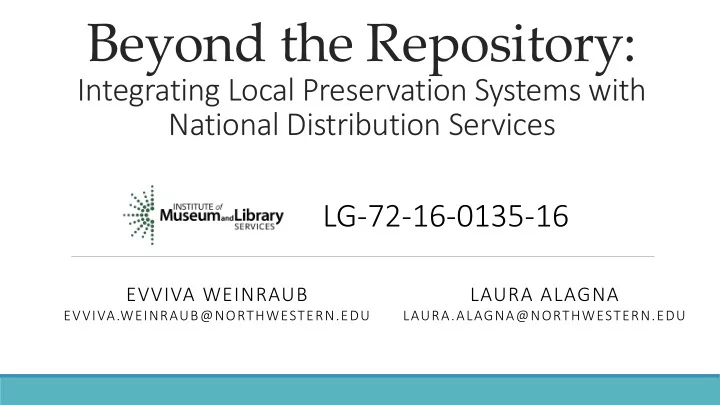

Beyond the Repository: Integrating Local Preservation Systems with National Distribution Services LG-72-16-0135-16 EVVIVA WEINRAUB LAURA ALAGNA EVVIVA.WEINRAUB@NORTHWESTERN.EDU LAURA.ALAGNA@NORTHWESTERN.EDU
Beyond the Repository: Goals • Investigate common problems in digital object curation, versioning, and interoperability between local repositories and distributed preservation systems • Identify broadly applicable use cases and design patterns • Propose high-level technical solutions
Beyond the Repository: People and institutions Northwestern University Advisory Board Evviva Weinraub (PI) Mike Giarlo (Stanford) Carolyn Caizzi Bert Lyons (AVPreserve) Laura Alagna Mary Molinaro (DPN) Brendan Quinn Gina Petersen Mike Ritter (University of Maryland) Justin Simpson (Artefactual) University of California San Diego David Wilcox (Fedora/DuraSpace) Sibyl Schaefer Andrew Woods (Fedora/DuraSpace)
Beyond the Repository: Research questions • How does one curate objects to ingest into a long-term dark preservation system? • How does versioning of objects and metadata play out in long- term dark preservation systems and how to automate these actions? • How can systems that store data differently be made more interoperable?
Beyond the Repository: Methodology 1. Gather information on the first two research questions via a survey of practitioners a. Understand the breadth of implemented local systems b. Identify local workarounds and metadata fixes in place to address these issues c. Gather data about local preferences around versioning d. Identification of preservation policies and rights issues 2. Hold a series of in-depth interviews to gather additional qualitative information 3. Using this data, work with the Advisory Board to design high-level requirements for increased interoperability between local and distributed systems 4. Disseminate findings
170 valid responses • 65% have collected 10 TB or more • More than 80% expected their content to • grow by at least 10 TB in the coming year Results: Wide geographic distribution represented, • survey metrics including 15 international responses Mostly academic libraries (77%) • 73 people were willing to discuss further • with us
Survey results: Systems used
Survey results: Distributed storage & number of copies • Respondents who 2 reported not keeping multiple copies cited 3 funding as the most common barrier 4 • 85% of respondents 5 reported keeping multiple copies in 6 multiple locations • Of these, the vast 7+ majority keep three copies
Survey results: Where copies of data are stored
Survey results: How copies are tracked Automatic Don’t keep track Homegrown tool IT support does it MetaArchive Conspectus Spreadsheet, database, or other manual method
Survey results: Versioning & curation When versioning distributed In terms of selection: copies: • 48% of respondents say they • 85% of respondents reported select a subset of materials to keeping all versions go to a distributed repository • 20% reported only keeping the • The top two selection criteria for newest version these materials were: • 20% were unsure • Mandate (legal, grant, or • Many indicated that versioning other) practices are dependent on • Intrinsic value the type of materials
• 12 institutions: • 6 public university libraries • 2 private university libraries • 2 museums • 1 public library Interviews: • 1 government archives a snapshot • Interviewees collectively use 8 different local repository systems and four different distributed digital preservation systems
Interview trends: Versioning & curation “We can't rely on the curators “I think our versioning has yet to help us with those value been somewhat haphazard choices... it kind of falls to us to rather than deliberate.” make some of those decisions, and we don't feel qualified to “It's this real manual versioning know what's more valuable, so going on, but it's not really it's kind of messy right now, and even true versioning. It's not it probably is going to need some recording exactly what was coordination in the organization changed.” to sort of get that right.”
Interview trends: interoperability “I think interoperability itself is “Right now, nothing is actually the main challenge that we're interacting together.” facing, to be able to get these different systems to work together, whether it's our “In a sense, our workarounds descriptive systems or are just doing things manually.” preservation.”
Interview trends: Brutal honesty “In terms of any sort of “It's really hard to convince catastrophic event, we're toast stakeholders that [digital pretty much.” preservation] is something that's worth spending money “We’ve been around since on. It’s not glamorous, it's 1849 and this is the first time invisible…there's just so many the institution has other competing things that acknowledged that are flashier things to spend preservation is worthy of a full money on.” time position.”
Next steps September/October: Report writing October: Advisory board meeting December: Report dissemination
Thank you LG-72-16-0135-16
Recommend
More recommend